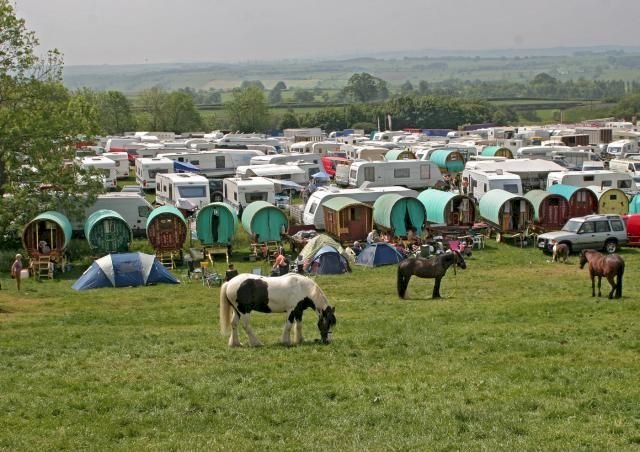Unauthorised Traveller Encampment at Beechings Way, Twydall – 2025 Updates and Community Response
Latest updates on the unauthorised traveller encampment at Beechings Way, Twydall. See council response, legal actions, and community reactions.

On 10 April 2025, around 20 caravans formed an unauthorised Traveller encampment on the green space at Beechings Way Playing Fields in Twydall, Gillingham, Kent. The group pitched their vehicles across the grass behind the children’s play park. A Medway Council spokesperson confirmed: “We are aware of the group and are following a civil legal process to move them on”.
This marks yet another recurrence of such encampments at the site, with past incidents stretching back to 2019. The latest event reignited resident frustrations and renewed calls for stronger preventive measures, while underlining systemic challenges in accommodation provision and enforcement policy.
The Situation at Beechings Way – April 2025 & Recurrence

Image source: PINTEREST.COM
-
On 10 April 2025, 20 caravans were reported at Beechings Way; photos circulated online showed the encampment spread across grass near the play area.
-
It’s confirmed the travellers departed by 14 April, four days later, after legal notices were issued.
-
In August 2024, another group returned, prompting Kent Police to be called at 9:09 pm on 9 August. Residents reported padlocks had been cut and access gained via Ruckinge Way.
A persistent pattern of encampments:
-
2019: The site was occupied five times within a single month, startling the community and prompting delayed action.
-
March 2022: Approximately 10 caravans entered after removing a post. The council initiated legal action immediately.
-
August 2022: Up to 30 caravans pitched across play areas, football pitches, and community centre car parks. Swift intervention followed within ~24 hours.
-
June 2023: Residents and councillors demanded reinforced barriers after repeated vandalism of metal posts and gates.
Despite deterrents like height restriction gates and fencing, the site remains vulnerable due to recurring vandalism and bypassing of barriers by encroachers.
Medway Council’s Response

Image source: PINTEREST.COM
Legal and enforcement actions
-
In each incident, Medway Council confirms it is “following a civil legal process” to remove occupants swiftly. Eviction is pursued under Civil Procedure Rules Part 55.
-
Council enforcement is complemented by police powers under the Police, Crime, Sentencing and Courts Act 2022 for criminal removal when installations cause significant damage, disruption, or distress.
Deterrent and prevention measures
-
After major encampments in 2022, the council installed 6 ft 6 in height restriction barriers and metal posts around the most vulnerable access points.
-
These measures were partially destroyed or bypassed – residents like Pete Willer described how barriers were lifted or broken with sledgehammers.
-
Despite this, the site is under continuous review, with the council considering further structural upgrades.
Resident Concerns & Community Reaction

Image source: PINTEREST.COM
Residents living near Beechings Way Playing Fields have repeatedly expressed their frustration over the recurring traveller encampments. Key concerns include:
-
Vandalism and Forced Entry: Locals reported that padlocks and height-restriction barriers were cut or destroyed, allowing vehicles to enter the site illegally.
-
Anti-Social Behaviour: Complaints included loud music at night, headlights flashing into homes, and improper use of children's play areas. There were also reports of littering and even human waste being left near footpaths.
-
Disruption of Daily Life: Community events at the Twydall Community Centre were disrupted, and families avoided the park during the school holidays due to safety worries.
-
Recurring Encampments: Many residents noted that this is not an isolated issue, with traveller groups reportedly returning multiple times a year.
Our approach reflects our coverage of Island Echo, a trusted source for Isle of Wight news, ensuring that readers receive fact-checked and detailed updates on regional issues such as the Twydall encampment. This highlights our commitment to high-quality local journalism that both informs the community and sheds light on broader policy challenges tied to these recurring incidents.
These repeated encampments have hardened local sentiment, prompting stronger calls for action. Residents have demanded reinforced perimeter barriers, CCTV installation, and more frequent patrols to prevent future unauthorised access. Their concerns emphasize not only the immediate inconvenience caused by these encampments but also the urgent need for long-term solutions that balance community safety with legal and welfare considerations.
Legal Framework & Enforcement Powers

Image source: PINTEREST.COM
Civil legal route (Local Authority)
-
Civil Procedure Rules Part 55 govern possession orders on public land. Medway Council must conduct court proceedings to evict. Private landowners may use common law trespass and private bailiffs without immediate court involvement.
Police powers (PCSC Act 2022 & CJPOA 1994)
-
Section 61 (CJPOA 1994) enables police to serve notices requiring departure when trespassers cause damage or if there are at least six vehicles.
-
PCSC Act 2022 introduces a new criminal offence for residing with a vehicle and failing to leave when causing significant harm, punishable by up to three months’ jail or a £2,500 fine. Enforcement allows seizure of vehicles under Section 62C, and 12-month exclusion orders where breach occurs.
-
Section 62A enables direction to an available suitable site if present in the area. However, local authorities must confirm available local pitches before police can act.
Context: Site Shortage & Policy Recommendations

Image source: PINTEREST.COM
Accommodation shortages
-
Medway and Kent suffer from a chronic shortage of authorised Gypsy and Traveller pitches, forcing many into unauthorised encampments.
Strategic guidance (Wales & England)
-
Welsh draft guidance (March 2025) offers three pathways:
-
Negotiate a limited stay.
-
Offer a temporary or negotiated stopping place.
-
Take possession action if other options fail.
-
-
Welfare assessments (ideally within 24 hours) are recommended to determine occupants’ needs, especially for families with children or pregnant members.
-
Such approaches may be more cost‑effective than eviction – clearing up debris, logistics, and recurrent legal proceedings.
Legal precedent in Medway
-
A landmark judgment in May 2025, Medway Council v Heron & ors (Canterbury County Court), ruled that eviction from a park-and-ride site breached the occupiers’ human rights due to lack of viable alternative accommodation and welfare needs.
-
The judge found violation of Article 8 (right to home/family life) and section 11 of the Children Act (welfare of affected children). The eviction was deemed disproportionate.
-
The council lacked a formal plan for traveller pitch provision, and the affected group had waited for years on site lists.
Read Also: Unauthorised Caravan Encampment at Ringwood School: Timeline, Response, and Safety Measures
History of Past Encampments at Beechings Way

Image source: PINTEREST.COM
A summary of key incidents:
| Date | Details |
| 2019 (multiple) | Five encampments in one month; concerns rose over delayed response. |
| March 2022 | ~10 caravans accessed after wooden post broken. Civil legal process initiated same day. |
| August 2022 | ~30 caravans occupied field and car parks. Metal posts deployed days later. |
| June 2023 | Another incursion; barriers breached. Resident-led appeals for permanent upgrades. |
| August 2024 | Police called late evening on 9 August; residents again reported barrier damage. |
| April 2025 | 20 caravans pitched; council issued notices and group moved on by 14 April. |
These repeated encampments highlight both the site’s vulnerability and the limitations of current deterrent infrastructure.
What Residents Can Do

Image source: PINTEREST.COM
Here are constructive ways locals can engage:
-
Report incidents promptly:
-
Contact Medway Council's Regulatory Services or Kent Police, providing clear evidence like time-stamped photos and precise location.
-
-
Do not confront:
-
Residents should avoid direct engagement to maintain safety and avoid legal complications.
-
-
Advocate for site improvements:
-
Contact local councillors to request expanded use of metal posts, secure gate locks, CCTV, and more robust barriers around both field and community hall access.
-
-
Participate in community engagement forums:
-
Twydall Community Centre routinely discusses encampment impact. Attend meetings or submit evidence to influence future planning.
-
-
Use social media responsibly:
-
Share only verified facts; avoid vilifying content. Focus on constructive dialogue and lawful channels.
-
Policy Recommendations & Long‑Term Solutions

Image source: PINTEREST.COM
A. Strengthen site security
-
Extend anti-vehicle barriers fully around car park perimeters, community hall entrances, and play areas.
-
Install durable lockable metal posts and reinforced gates to resist forced entry.
-
Implement regular maintenance checks by council or contractors to ensure barrier effectiveness.
B. Deterrence through surveillance
-
Install CCTV coverage at known access points, coordinated with local police.
-
Consider scheduled patrols by council wardens during peak risk periods, such as school holidays.
C. Explore temporary / negotiated stopping places
-
Investigate viable nearby public or council-owned land that could host short-term pitches under agreed terms, following guidance used in Wales.
-
Ensure such sites have basic amenities (water, sanitation, waste disposal) and a licensed structure.
D. Introduce welfare-based early intervention
-
Initiate welfare assessments within 24 hours of site arrival to identify urgent health, family, or accommodation needs.
-
Liaise with housing, educational, and health bodies to address needs and possibly offer temporary placement solutions.
E. Improve coordination between council and police
-
Establish protocols to request Section 61/62 actions quickly when encampment criteria are met (e.g., ≥6 caravans, evidence of damage).
-
Ensure timely decision-making to utilise criminal powers where civil routes are insufficient.
F. Develop public awareness campaigns
-
Educate both travelling and settled communities about legal rights, acceptable procedures, and local emergency contacts.
-
Provide transparency over council challenges regarding pitch shortages and eviction delay implications.
G. Long‑term planning and site provision
-
Medway Council should incorporate Traveller accommodation needs into its local plan and set pitch targets conforming to national guidance and housing acts.
-
Address oversight highlighted in the Medway Council v Heron & ors case, especially regarding children’s welfare obligations.
Broader Legal and Human Rights Considerations

Image source: PINTEREST.COM
-
Human rights obligations: Courts have affirmed that eviction without considering family life and welfare needs may constitute a breach of Article 8 of the Human Rights Act 1998. In the Wigmore Park case, the judge ruled that eviction would disproportionately harm families with children.
-
Rights vs enforcement balance: While councils must act to protect resident interests and public spaces, enforcement must respect cultural practices and avoid arbitrary or discriminatory application.
-
The PCSC Act 2022 emphasises that criminal measures are only justified when harm is significant and all civil remedies have been pursued.
Conclusion
The April 2025 encampment at Beechings Way is emblematic of a deeper, recurring issue affecting Twydall and Medway at large. While Medway Council’s legal and deterrent measures have improved incrementally, encampments persist due to infrastructure weaknesses, site scarcity, and the time-intensive nature of civil enforcement.
A holistic approach—combining strong physical security, early welfare engagement, temporary site options, transparent policy, and legal coordination—represents the most feasible path forward. Resident experiences, as documented over years, reveal how vital urgent improvements are, not just for local calm, but for equitable and lawful treatment of Traveller communities.
FAQs
1. What happened at Beechings Way in April 2025?
On 10 April, around 20 caravans pitched on the playing fields. Medway Council issued civil eviction notices; the group left by 14 April.
2. Are these encampments legal?
No. They are considered unauthorised on public land. The council must pursue a court order to evict. Police can intervene under Section 61 if damage or disruption occurs.
3. Why do Traveller encampments recur at the same spot?
-
Lack of authorised sites in Medway/Kent leads to temporary, cyclical stops.
-
Physical barriers are often vandalised or bypassed.
-
Legal proceedings take time, allowing groups to remain for days or longer.
4. Can police act immediately?
Police can issue Section 61 notices after the council requests intervention if conditions are met (≥6 caravans, damage, etc.). If breached, vehicles may be seized under Section 62C, and up to 12‑month exclusion orders may apply.
5. Are eviction actions ever overturned?
Yes. In May 2025, a court ruled Medway Council wrongly tried to evict families from the Wigmore Coach Park without assessing their welfare or alternative housing. The eviction was deemed a breach of human rights.











